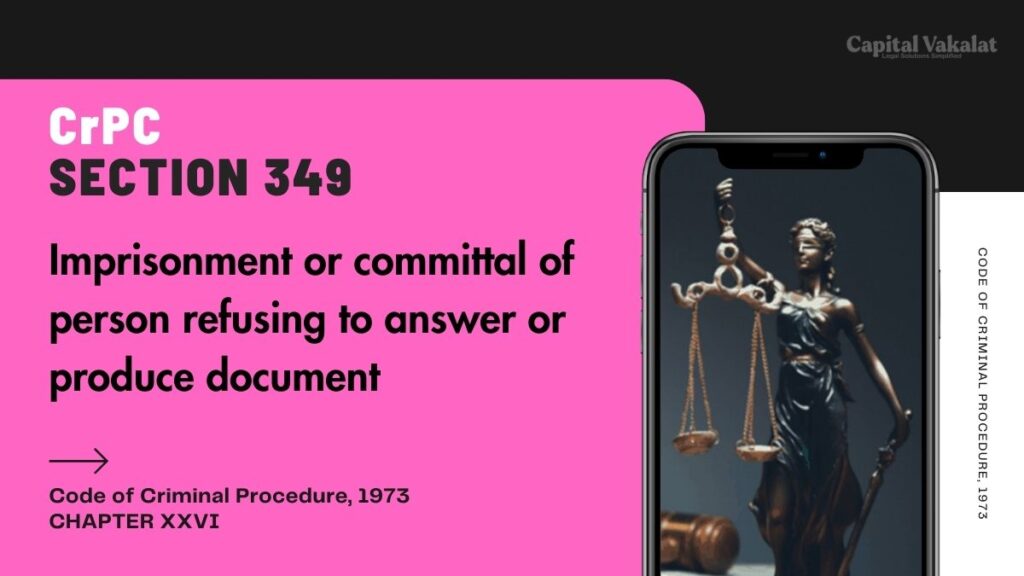In the intricate legal landscape, Section 349 of the Criminal Procedure Code (CrPC) holds significant importance. This section addresses the imprisonment or committal of a person who refuses to answer questions or produce documents during judicial proceedings. Understanding the nuances of this provision is crucial for legal professionals, law students, and individuals involved in legal processes.

This article delves into the details of Section 349 CrPC, exploring its implications, practical applications, and the balance it seeks to maintain between judicial authority and individual rights.
Introduction to Section 349 CrPC
Section 349 CrPC empowers a judicial officer to deal with individuals who refuse to cooperate during judicial proceedings by either answering questions or producing documents. This provision ensures the smooth functioning of the judicial process by compelling compliance and maintaining the authority of the court. However, this power is not absolute and comes with checks and balances to prevent misuse and protect individual rights.
Historical Context and Evolution of Section 349 CrPC
The Criminal Procedure Code, enacted in 1973, consolidated and reformed the laws relating to criminal procedures. Section 349 has its roots in earlier legal frameworks designed to ensure judicial efficacy. Over time, amendments and judicial interpretations have shaped its current form, balancing judicial authority with safeguarding individual liberties. Understanding this historical evolution provides a comprehensive perspective on the rationale behind this provision.
Legal Framework and Key Provisions
Scope and Applicability
Section 349 CrPC is applicable during any judicial proceeding where an individual is required to answer questions or produce documents. The scope extends to witnesses, defendants, and any other persons present in the court.
Procedure for Imprisonment or Committal
The section outlines a specific procedure that must be followed before an individual can be imprisoned or committed. This includes giving the person an opportunity to comply and providing a clear warning about the consequences of non-compliance.
Limitations and Safeguards
To prevent misuse, Section 349 CrPC includes safeguards such as judicial oversight, the right to appeal, and adherence to principles of natural justice. These safeguards ensure that the power is exercised judiciously and fairly.
Practical Implications and Case Studies
Ensuring Judicial Efficiency
Section 349 CrPC plays a vital role in ensuring judicial efficiency. By compelling compliance, it prevents delays and obstructions, thereby facilitating the timely administration of justice. Case studies from various courts highlight its effectiveness in maintaining order during proceedings.
Balancing Judicial Authority and Individual Rights
While the section empowers judicial officers, it also raises concerns about potential abuse of power. The balance between enforcing compliance and protecting individual rights is delicate. Analyzing landmark judgments helps in understanding how courts have navigated this balance.
Real-Life Applications
Practical examples from recent cases illustrate the application of Section 349 CrPC. These examples shed light on the circumstances under which the provision is invoked and its impact on the proceedings.
Critical Analysis and Judicial Interpretations
Constitutional Validity
The constitutional validity of Section 349 CrPC has been upheld in several judgments. However, challenges have been raised regarding its potential conflict with fundamental rights such as the right to silence and protection against self-incrimination. Examining these judicial interpretations provides a deeper understanding of its constitutional implications.
Judicial Precedents
Key judgments from higher courts have set precedents on the application of Section 349 CrPC. These judgments serve as guiding principles for lower courts and legal practitioners, shaping the practical application of the provision.
Comparative Analysis with International Laws
A comparative analysis with similar provisions in international legal systems highlights the uniqueness and commonalities of Section 349 CrPC. Understanding these comparisons enriches the perspective on its efficacy and areas for potential reform.
Conclusion
Section 349 CrPC is a crucial provision in the Criminal Procedure Code that ensures judicial compliance and efficiency. By empowering courts to imprison or commit individuals who refuse to answer questions or produce documents, it maintains the authority and smooth functioning of judicial proceedings. However, the provision also incorporates safeguards to protect individual rights, balancing judicial power with principles of natural justice. Understanding the nuances of Section 349 CrPC is essential for legal professionals and individuals involved in judicial processes, providing insights into its application, implications, and the broader legal framework.